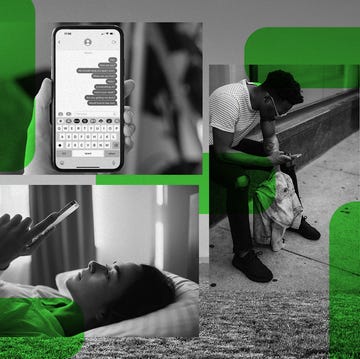When you think of The Perfect Relationship, it likely involves things like romantic date nights, good sex, and nonstop Netflix marathons. What it probably doesn’t include? Regular meetings where you and your significant other talk about the health of your partnership. Even though it might not seem as sexy as foreplay or romantic movie nights, relationship check-ins are sort of essential to building a lasting connection.
In case you’ve never heard of this trusty ol' couples tool, simply think of a relationship check-in as a guided, open, and honest talk with your S.O. about your bond. “It’s a time in which you and your partner set aside all other responsibilities and are intentional about focusing on one another and your relationship,” explains couples therapist and relationship scientist Marisa T. Cohen, PhD, LMFT. Basically, you chat about what’s going well, what could use improvement, and how you’re each feeling in your relationship overall.
It’s important to note that this isn’t just reserved for relationships that are on the rocks. In fact, Cohen says relationship check-ins are beneficial for all couples — even the ones who are (or *think* they are) rock-solid. “We often make assumptions about our partner and our relationship based on our perception,” she explains. “Having a check-in enables us to get a better understanding of our partner’s perspective, their perception of what is working within the relationship and what needs to be strengthened, as well as [an opportunity] to address any gaps that exist between the two of you.”
All this is to say that no matter how things are going or what type of relationship you have, a check-in is probably long overdue. Read on for everything you need to know about relationship check-ins so you can keep your bond hella strong.
What Is The Actual Purpose of a Relationship Check-In?
As mentioned, the goal of a relationship check-in is to get an idea of how you and your partner feel about the current state of your relationship. Some people do it weekly, some people do it monthly, and some people do it more sporadically — it all depends on what works best for your schedule and your connection.
Topics-wise, Cohen says the conversations should vary based on what each partnership is dealing with. “Generally, it's important for couples to address their strengths as a couple, as well as what they are hoping to improve upon and address,” she explains. Some people use it as a chance to discuss upcoming plans (such as time spent together or apart, holidays, etc.), small hurts, and feelings of gratitude. Additional topics Cohen often encounters include family and friend issues, finances, sex, chores, goals, and miscommunications. Basically, you just want to make sure to discuss what's going on in your lives as individuals and as a unit, and how it all influences your connection.
Who Is a Relationship Check-In Good For?
While you might have thought these check-ins were only reserved for floundering relationships, the reality is that literally every couple can benefit from them — even the ones who feel like they’re in a nonstop honeymoon phase.
“These conversations are really helpful when they're proactive,” Cohen explains. “Rather than being used to address issues that a couple may be facing in a reactionary way (which is fine), a couple may use these conversations to discuss what is going well within the relationship. If you and your partner are able to acknowledge and celebrate strengths, you're in a wonderful position to proactively maintain a satisfying and secure connection.”
Take Elaine, a 28-year-old communications coordinator in Brooklyn. She says check-ins were super helpful in her previous relationship because they provided time and space to unpack things that might not have otherwise come up.
“The questions I appreciated most focused on small issues or topics that had triggered or upset either of us that we may have deemed too insignificant to mention in day-to-day convos,” she says. “This was the first relationship I had done check-in questions in, and it’s also the first relationship I really felt like I was trying to improve myself and our bond during.”
Not to get all intense on ya, but Cohen says if a couple isn’t in the habit of checking in with each other regarding the health of their connection, it’s important that they add it to their routine ASAP. “Doing this regularly and consistently is key to strengthening your relationship,” she explains. Pencil it in now, folks!
How to Have a Relationship Check-In
According to Cohen, check-ins are actually quite common, but what they look like varies greatly from relationship to relationship. For some couples, they're low key and involves casual conversations where feelings and needs are discussed. Other couples, though, might prefer a more formal structure with a standing appointment (weekly, monthly, or whatever frequency they prefer) and a list of regular questions. We’re talking scheduled, on-the-shared-Google-cal type of appointments. There’s no right or wrong here, as long as whatever you decide works for everyone.
In general, though, you’ll want to dedicate a specific amount of time (say, 30 minutes) to talk distraction-free in a safe, neutral space. It's a good idea to set a timer — or at least keep an eye on the clock—to keep the check-in from turning into a marathon feelings sesh. When it comes time to chat, simply take turns asking and answering questions, ensuring you both practice active listening while discussing your wants and needs.
One thing to keep in mind is that because you’re discussing serious topics (this isn't the time to gossip about work or debate what to order for dinner), the convo *could* get a lil tense. You’ll want to have a plan — like permission to change the topic or take a breather — ready if things get heated.
At the end of the talk, discuss and commit to action items you can each take — individually and as a couple — to strengthen your partnership. Finally, finish the convo off with a hug, smooch, or celebratory glass of wine. You did it!
If you’re stuck on what to actually talk about, here are a few prompts to get you started:
- What have you loved most about our relationship in the last week/month?
- Have there been any points of contention/things you’re unhappy about in our relationship this past week/month? How can we fix this?
- What’s something I’ve done recently that made you feel especially loved?
- Have I done anything to upset or hurt you this week? How can I make it better?
- What’s a sweet/kind/romantic gesture you did for me this week that I didn’t notice?
- How do you feel about the frequency/quality of our sex/physical intimacy lately? How can we improve?
- How would you rate our communication this week/month?
- Is there anything I’ve stopped doing that you used to like?
- Is there anything new you’d like to try together?
- How do you feel about the division of our household responsibilities? Is our system still working for you?
- Do you have any known stressors coming up? How can I help?
- Have we been spending enough quality time together? What would make you feel closer to me?
- Is there anything to be aware of on the calendar or anything you’d like to add?
It’s a good idea to ask the same or similar questions each check-in (you can always add new ones!), so you have a solid understanding of how your relationship is evolving. And if you prefer a little more structure, Cohen says apps such as Couply and Agape are great since they can help you get to the core of any issues and provide additional resources.
Truthfully, whatever your check-in looks like, being open and vulnerable is really what matters most. “It is imperative that both partners feel safe and secure,” Cohen explains. While it might feel a little strange at first, your relationship check-in could quickly become the best part of the week…or at least the most productive!
Get Shondaland directly in your inbox: SUBSCRIBE TODAY












